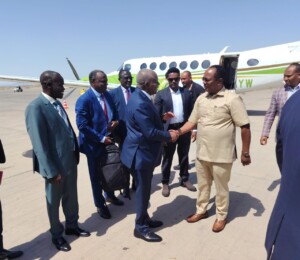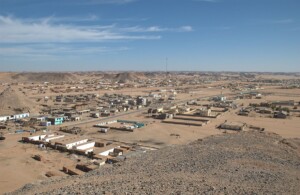Sudan opposition: Political accord gives all power to junta
The members of the National Consensus Forces (NCF, a coalition of opposition parties) have expressed strong reservations to the contents of the political agreement between the ruling Transitional Military Council (TMC) and the opposition Forces for Freedom and Change (FFC). The FFC have postponed negotiations about the Constitutional Declaration.
 Lt Gen Mohamed Hamdan 'Hemeti', Vice-President of the Transitional Military Council, speeching in Khartoum, June 2019 (File photo)
Lt Gen Mohamed Hamdan 'Hemeti', Vice-President of the Transitional Military Council, speeching in Khartoum, June 2019 (File photo)
The members of the National Consensus Forces (NCF, a coalition of opposition parties) have expressed strong reservations to the contents of the political agreement between the ruling Transitional Military Council (TMC) and the opposition Forces for Freedom and Change (FFC). The FFC have postponed negotiations about the Constitutional Declaration.
In response to negative reactions from the armed movements and the NCF on the power-sharing deal signed by the TMC and FFC on June 17, the FFC negotiating team cancelled their meeting with the military junta on Friday.
“We need more internal consultation to reach a united vision,” Omar El Degeir, chairman of the activist Sudan Congress Party explained AFP news agency.
After the FFC and the junta agreed on power-sharing issues on the armed movements on July 5, Sudanese rebel movements called for a meeting of all signatories of the Declaration of Freedom and Change in Addis Ababa, “to consolidate the unity of the Sudanese opposition and agree on issues of peace and democratic change in the country”.
While delegations of the opposition forces were discussing the contents of the political agreement in the Ethiopian capital, the FFC negotiation team signed the deal in Khartoum.
Failing deal
The NCF said in a statement on Thursday that the agreement “goes towards granting of power to the military junta and does not meet the demands of the revolution, including a civilian-led government”.
The political deal also fails to provide for an international commission of inquiry into crimes committed throughout President Al Bashir’s rule, the NCF stated.
According to the opposition coalition, the FFC negotiating team was not authorised to sign. It did not elaborate on this point however.
It further criticised the signing of the political agreement separately from the constitutional document, and emphasised the importance to take in the views of the signatories of the FFC and the armed movements.
They urge the FFC to solve imbalances in the agreement through the Constitutional Declaration text. The Sudanese people should be able to comment on the draft text of the Constitutional Declaration before it will be signed.
Sovereign Council
According to the text of the agreement, a Sovereign Council, consisting of 11 members, will rule the country. Five members will be from the military, five will be civilians. The 11th member will be civilian, to be selected by both the TMC and the AFC.
The presidency will rotate. The coming 21 months, the president will be from the military, followed by a civilian for 18 months. Elections will be held after a transitional period of three years and three months.
The cabinet will exist of technocrats, to be selected by the FFC.
An agreement has also been reached on a “national investigation” into the violent break-up of the Khartoum sit-in on June 3.
Reactions
The various stakeholders have reacted differently to the agreement between the military junta and the FFC (formerly known as the Alliance for Freedom and Change/AFC).
While the international community and the National Umma Party welcomed the deal brokered by the African Union and Ethiopian mediators, the armed movements, displaced people in Darfur, and Sudanese journalists rejected the contents of the document.
According to Minni Minawi, head of the Sudan Liberation Movement and chairman of the Sudan Revolutionary Front coalition of armed movements, the agreement “does not reflect the country's pressing issues nor respects its sacrifices”.
It is “just a contract concluded with the security forces to hit the [armed] movements and oppress the regions in the margin through a so-called civilian legitimacy”, he said. “What is required is not the transfer of power from military to civilian, but the removal of the causes and root causes of the crisis that led to genocide and the secession of the South Sudan.”
Our editorial independence means that we can continue to provide factual updates about ongoing protests to Sudanese and international actors, educate people about how to avoid outbreaks of infectious diseases, and provide a window to the world for those in all corners of Sudan. Support Radio Dabanga for as little as €2.50, the equivalent of a cup of coffee.












 and then
and then